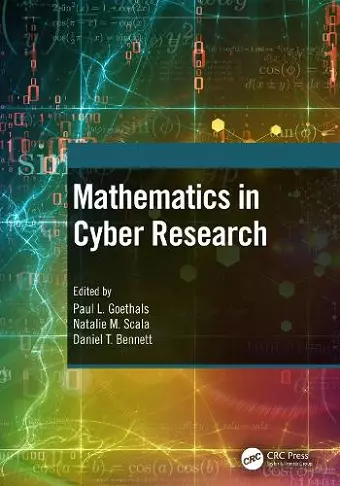Mathematics in Cyber Research
Daniel T Bennett editor Paul L Goethals editor Natalie M Scala editor
Format:Hardback
Publisher:Taylor & Francis Ltd
Published:7th Feb '22
Currently unavailable, and unfortunately no date known when it will be back

In the last decade, both scholars and practitioners have sought novel ways to address the problem of cybersecurity. Innovative outcomes have included applications such as blockchain as well as creative methods for cyber forensics, software development, and intrusion prevention. Accompanying these technological advancements, discussion on cyber matters at national and international levels has focused primarily on the topics of law, policy, and strategy. The objective of these efforts is typically to promote security by establishing agreements among stakeholders on regulatory activities. Varying levels of investment in cyberspace, however, comes with varying levels of risk; in some ways, this can translate directly to the degree of emphasis for pushing substantial change.
At the very foundation or root of cyberspace systems and processes are tenets and rules governed by principles in mathematics. Topics such as encrypting or decrypting file transmissions, modeling networks, performing data analysis, quantifying uncertainty, measuring risk, and weighing decisions or adversarial courses of action represent a very small subset of activities highlighted by mathematics. To facilitate education and a greater awareness of the role of mathematics in cyber systems and processes, a description of research in this area is needed.
Mathematics in Cyber Research aims to familiarize educators and young researchers with the breadth of mathematics in cyber-related research. Each chapter introduces a mathematical sub-field, describes relevant work in this field associated with the cyber domain, provides methods and tools, as well as details cyber research examples or case studies.
Features
- One of the only books to bring together such a diverse and comprehensive range of topics within mathematics and apply them to cyber research.
- Suitable for college undergraduate students or educators that are either interested in learning about cyber-related mathematics or intend to perform research within the cyber domain. The book may also appeal to practitioners within the commercial or government industry sectors.
- Most national and international venues for collaboration and discussion on cyber matters have focused primarily on the topics of law, policy, strategy, and technology. This book is among the first to address the underpinning mathematics. <
"This volume edited by Goethals (United States Military Academy), Scala (Towson Univ.), and Bennett (National Renewable Energy Laboratory) is one of the best showcases of foundational algorithms and new research directions applied to computing this reviewer has seen. The range of topics could provide a basis for implementation in many areas. Although it would be impossible to cover all mathematical contributions to computer science in one book, the breadth of content here inspires awe. Fields include combinatorics, cryptography, data analytics, game theory, and quantum theory, and cybersecurity is emphasized in several chapters. Contributing authors position their material in the context of interconnectivity, the Internet of Things, and quantum computing. Readers will need significant background in linear algebra, calculus, and statistics. Naturally, foundational knowledge in computer science (networking, AI, and the theory of computation) will be helpful. A list of references accompanies each chapter, facilitating preliminary research toward more-advanced studies. Overall, the book is an excellent resource for students interested in applied math or advanced algorithms and for experienced scientists, educators, or practitioners who must investigate mathematical topics in a computing domain. Practically all areas covered are worthy of attention from graduate and postgraduate researchers. In addition, many sections include practical applications in computing and system development.
Summing Up: Highly recommended. Lower- and upper-division undergraduates. Graduate students, faculty, and professionals."
- J. Brzezinski, McHenry County College, CHOICE Review
ISBN: 9780367374679
Dimensions: unknown
Weight: 997g
524 pages